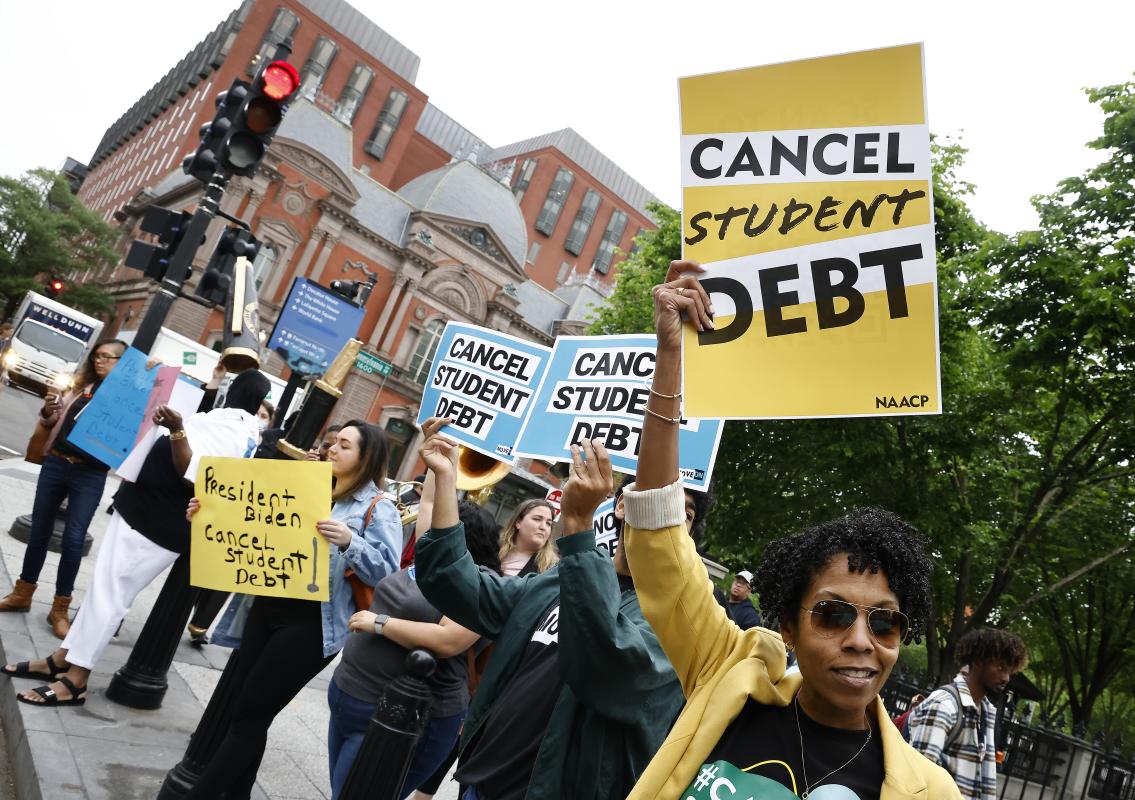
White House officials are planning to cancel $10,000 in student debt per borrower, a central campaign promise by President Biden that would relieve debt for millions of Americans, according to The Washington Post.
Biden’s proposal, however, is still not finalized.
The announcement of the president’s plan to address the $1.7 trillion currently owed to the federal government in student debt had been speculated by many to come as soon last Saturday, when Biden made a commencement speech at the University of Delaware. According to the Post, the timing of the announcement was delayed after the mass shooting in Texas on May 24.
The plan would limit debt relief to Americans earning $150,000 and $300,000 for couples filing jointly, based on income from the previous year, White House officials told the Post. It is currently unclear whether the administration will require borrowers to resume payments on federal student loans when the pandemic-era moratorium is scheduled to expire at the end of August.
Multiple sources familiar with the topic told Inside Higher Ed that they have not received communication from the Biden administration on any proposal to relieve student debt.
The plan to relieve $10,000 per borrower falls short of what progressive Democrats and debt relief advocates have long called for—across-the-board student debt relief. At minimum, progressive Democrats such as Senators Elizabeth Warren of Massachusetts, Raphael Warnock of Georgia and Chuck Schumer of New York have asked Biden to cancel at least $50,000 in debt per borrower.
“Ten thousand dollars of student debt cancellation is not enough to narrow the racial wealth gap, boost the economy or turn out needed voters in November,” said Braxton Brewington, spokesperson for the Debt Collective. “It’s grossly inadequate and doesn’t match the scale of the crisis. Biden should cancel every dollar and ensure cancellation is automatic so everyone can get their owed relief without jumping through administrative hoops.”
The NAACP issued a statement Friday with reasons that relieving $10,000 would not be enough. “Two key data findings bolster our claim that student debt disproportionately harms low-income households and, in particular, low-income Black households. First, we find that more than half of all student loan debt is held by households that have a zero or negative net worth. Second, we find that of households with student debt, 52 percent of Black households and 32 percent of non-Black households have zero or negative net worth,” the NAACP said.
It added, “Student debt can delay or change a household’s decisions on a number of issues: where to live, what type of work to do, starting a family, purchasing a home, or launching a business.”
Biden told reporters in late April that he would be making an announcement on his plan to address student debt in the coming weeks. After news broke that the administration was considering placing an income cap on who would qualify for debt relief, Education Department officials warned such a plan would create an administrative “train wreck,” because the department lacks access to income information from borrowers.
According to 2021 data from the Education Department, an across-the-board plan to relieve $10,000 in debt per borrower could help 15 million Americans. A majority of borrowers—53 percent, according to federal data—hold less than $20,000 in federal student loans.
On Thursday, a coalition of more than 500 organizations representing a diverse set of interests, including labor, civil rights and education, sent a letter to the president demanding that he use executive authority to cancel student loan debt “immediately.”
“When borrowers’ student debt is canceled, their ability to pay down other debts increases; their geographic mobility and ability to stay in rural communities improves; as do their opportunities to pursue better jobs,” said the letter. “President Biden should protect all student loan borrowers, by canceling existing debts.”
Across-the-board debt relief, the letter continues, would “strengthen the economy, tackle racial disparities, and provide much-needed relief to help all Americans weather the pandemic and record inflation.”
A 2022 survey from Data for Progress shows that 61 percent of voters favored some form of debt cancellation from the federal government.
According to Scott Buchanan, executive director of the Student Loan Servicing Alliance, an organization that represents 95 percent of all servicers that oversee federal student loans, the lack of communication from the administration has loan servicers concerned about administrative overload.
“We’ve had no discussions with the department on how any of this could be operationalized or what the contours of the program look like. Preparing for that unknown is virtually impossible,” said Buchanan.
Republicans in Congress have held that student debt forgiveness would disproportionately benefit the wealthy and believe that Biden does not have the power to cancel student loan debt via executive action. A coalition of Republican senators recently introduced a bill that would prevent Biden from canceling student debt.
“Congress is not going to pass legislation giving the president the authority, nor will they pass legislation denying the president the authority. Right now, the initiative on this question is totally in the hands of the Biden administration,” said Terry Hartle, senior vice president of government relations and public affairs at the American Council on Education. “So they can and apparently will proceed. It is possible, indeed, perhaps likely that there will be lawsuits, challenging the Biden administration’s actions, and who knows where that will end up if it happens.”
 from Inside Higher Ed https://ift.tt/ILM9EXV
from Inside Higher Ed https://ift.tt/ILM9EXVvia IFTTT
Comments
Post a Comment